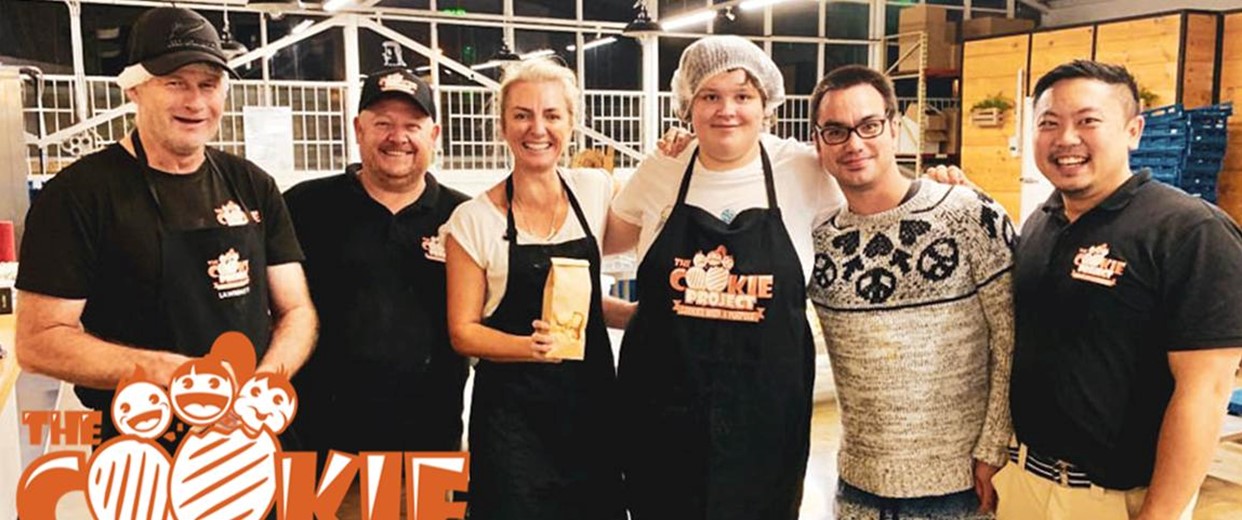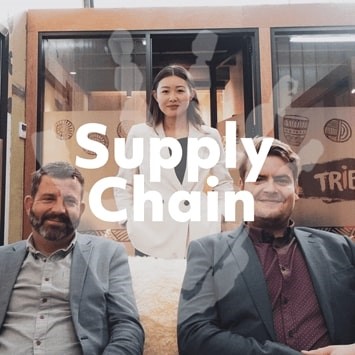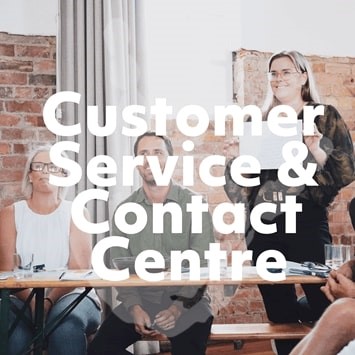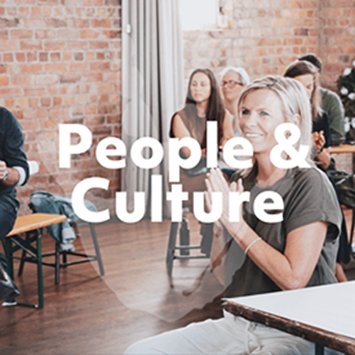How Eric Chuah built the social enterprise which helps people with disabilities find work
The Cookie Project is a social enterprise that provides paid work experience for people with disabilities. In a very short time, they have already made a name for themselves in the New Zealand market - we literally bump into them everywhere! As a partner of theirs, we wanted to share their story with you, so we grabbed a cup of tea and a bag of cookies and chatted to Eric Chuah, one of The Cookie Project's Co-Founders, to hear their story and find out why only 22% of people with disabilities are employed.
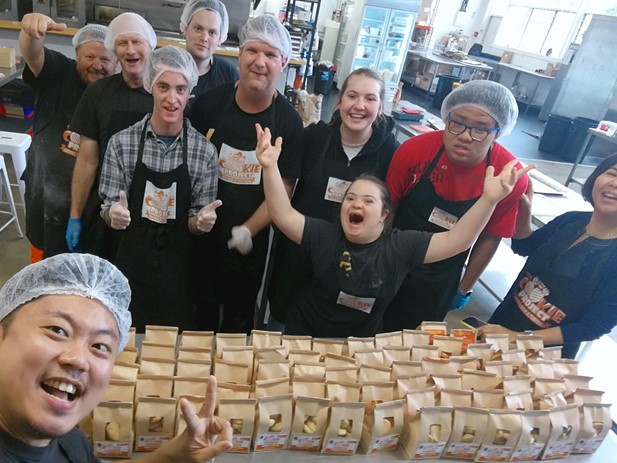
Introduce yourself and tell us a bit about The Cookie Project
Kia Ora everyone, my name is Eric Chuah, I am the co-founder of The Cookie Project - a certified social enterprise that is leading the way in New Zealand to provide meaningful employment with a decent wage, paying at least the minimum wage of $18.90 an hour to make delicious cookies. Not many people realise that 1 in 4 Kiwis have a disability, and their low employment rate is indicative of the barriers to meaningful employment. These barriers have existed for over half a century and we are breaking down these barriers and social stigma through various products, experience, and engagement with our brand.
Where did the idea for a social enterprise come from?
It started off with some cookies!
I am very passionate about social enterprise and I believe that social enterprise is the way to transform New Zealand’s economy, but also at the same time tackle some of the really urgent social issues. In one of my speaking engagements, one of the audience members came up to me and told me about his situation. His name is Graeme, who is now my business partner, and I was absolutely amazed by his compassion for the disadvantaged and the disabled community. He actually adopted four children, of which all of them have a disability, three of them, in particular, have a cocktail of mental disabilities such as fetal alcohol, ADHD, Epilepsy, and some other medical terms I can’t even pronounce. When I came across his story I thought wow, we really need to help this man. He gave me some of his cookies two Christmases ago and I fell in love with the cookies. I thought wow, we have the potential to create a future for his family and for the wider disability community as well.
Tell us about the different roles at The Cookie Project
We are continuously evolving our employment model to be human-centered around our bakers and we aim for world-class standards when it comes to inclusion, engagement, and belonging. When we first started, we try to make the environment fun, so we have actually gamified the attendance for our bakers. So, every person with a disability that joins us comes on board as a Cookie Apprentice to start with, and then after five baking sessions, they move on to become a Cookie Cadet where they will earn their very first cap (which is a very nice merchandise cap). Then, after another five sessions, they move onto becoming a Cookie Officer where they earn a t-shirt. Finally, after 15 sessions they move on to become Cookie Captain with their own personalised apron.
Since then, we have introduced a performance-based development that teaches our bakers the importance of productivity in the kitchen as much as their attitude and passion.
Tell us how far you’ve come in the last 12 months and what the next 12 months have in store for you
Since launching in June 2018, our cookie fans have supported us to generate over 2,000 hours of employment for more than 30 Kiwis with disabilities. Our market leading open hiring and pan-disability policy have earned 12 awards and much recognition, including being the recipient of 2019 Attitude ACC Employer Award. The rave reviews of our chocolate chip cookies attracted our PM Jacinda Ardern to drop in for baking lessons with our Cookie Captains! Our edible Cookie Cups won the annual hot chocolate challenge last year. This year, we’ve pivoted our business to include a new cookie premix range that became a hot item across social media.
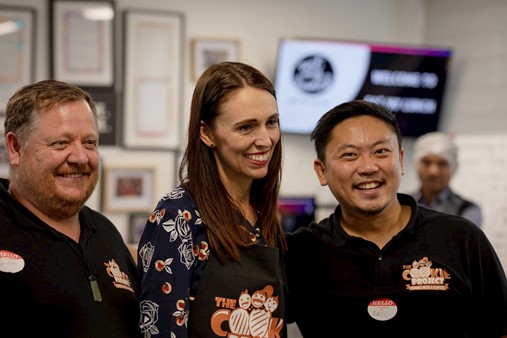
Do you have big plans for growth?
To be self-sustainable in the long run means we must adopt a commercial mindset to win by quality, not by sympathy. This is the core of our business model and we've verified the market appetite for quality cookies over the past 2 years. This year, we are going to resume the plan to scale up by establishing our own kitchen (fingers crossed by September!) and empower any self-driven Kiwis with disabilities to be a self-employed local cookie agent. We have a few other innovations in the pipeline that will help to facilitate disability and inclusion conversation at a younger age so that young Kiwis grow up with an inclusive mindset and learn to understand, appreciate, and value 1 in 4 Kiwis living with disabilities. We're also proactively working with other social enterprises that share the same values and purpose so that we can synergise our impact, expand our disco floor and invite even more new friends to join us in our disability whanau (family or community in Maori). We are very proud to develop a unique Kiwi solution to a global social issue that aligns with the UN's SDG #8 on decent work and economic growth and SDG #10 on reduced inequalities.
Is it difficult for people with disabilities to find a job in New Zealand?
People with disabilities in New Zealand face a huge employment challenge. A lot of people do not realise that one in four Kiwis have a disability, so that's over one million Kiwis. The employment rate for those people is a shocking and unacceptable low of 22%. If you compare that with other developed countries like Australia at 54%, the UK at 49%, Japan at 51%, and China 53%. New Zealand is way, way lower compared to everyone else. So that is the purpose of The Cookie Project, to generate employment for people with disabilities.
What challenges do people with disabilities face when they are looking for a job?
People with disabilities face so many challenges when they look for a job. First and foremost, there is a social stigma against them because a lot of people have a misunderstanding about what people with disabilities can do. They focus on what people with disabilities can’t do instead of focusing on what they can do. The second thing is that the employment and recruitment framework needs to change in New Zealand. Asking questions like 'do you have a disability’ and ‘what are your medications’ is actually a roadblock. A lot of employers will actually cut off the candidate simply because they have a disability.
*There are however organisations out there - shout out to Sudima Hotels – who approach their recruitment differently. As soon as you mention you have a disability, you go straight through to an interview rather than being shortlisted. It's really impressive. The third thing that people with disabilities face is unconscious bias and it is very sad to see that a lot of the recruitment managers have this implicit bias about what people with disabilities can't do instead of focusing on what they can do. We are here to show everyone that people with disabilities can do amazing work. I encourage everyone to come to our kitchen, spend time with our bakers and be impressed, be amazed, and be inspired.
Do you have any advice for employers about how to create an accessible workplace?
I think first and foremost you have to ask yourself what is the purpose of your business? These days, employing people with disabilities is not just good for business, but it is also the right thing to do. So, ask yourself, how is your business making New Zealand a better place today, and also in the long run? When you ask yourself that question deep down inside, you will find a place in your heart to start thinking - hey maybe I should give the people with disabilities a chance to come to the workplace, maybe I should give them a chance to shine and blossom in the workplace.
What practical things can businesses do?
I think, be serious about creating an inclusive workforce. When you think about diversity and inclusion in the workplace a lot of times, we tend to focus a lot around gender, ethnicity, or sexual orientation, but disability tends to drop off from the conversation.
The first step is for your senior leadership to revisit what your diversity policy actually means, and if accessibility is not part of your diversity conversation then you are really not serious about diversity. I think the second step from there is just to have an open mind. There are some amazing organisations out there like The Accessibility Tick for example where you can actually go through an accreditation process to evaluate your business, your policies, and processes to make sure that you are not blindsided by your unconscious bias. And of course, the third step is to speak to employers who currently employ people with disabilities. You will be amazed by the business performance that people with disabilities can bring to your organisation.
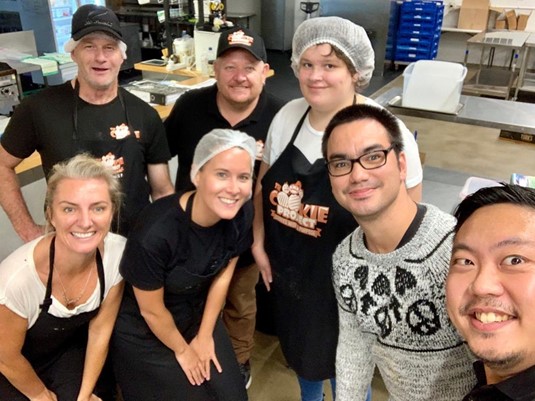
What should people do if they want to volunteer?
We welcome people to drop by our kitchen. Volunteers that come to The Cookie Project are called Cookie Champions because they are champions for handmade cookies without any preservatives, additives or colouring, but most importantly, they are also champions for the disability community. If you guys want to come here for a team-building exercise or a voluntary experience drop us an email and we would love to host you guys!



